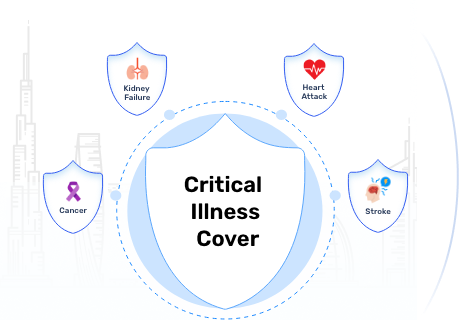Critical Illness Insurance Vs Hospital Indemnity
Understanding the difference between critical illness coverage and a hospital indemnity plan is crucial when selecting health or life insurance in the UAE. While both offer financial protection in the event of illness, they cater to different needs and in different ways.
Critical illness cover provides a lump sum payment upon diagnosis of severe medical conditions such as cancer, heart disease, or stroke. This payout can be used to cover medical costs, living expenses, or even a lifestyle change.
On the other hand, a hospital indemnity plan helps you cover the costs related to medical treatment as well as hospitalisation such as room charges, surgery, and other in-hospital expenses. While both plans offer valuable coverage, they serve distinct purposes and can complement each other for a more comprehensive health insurance package.
It’s important to understand how each plan works and choose the one that best fits your healthcare needs and financial situation in the UAE.
What is Critical Illness Cover?
Critical illness insurance provides a lump sum payout that can be used for any expenses, including costs related to serious illnesses like cancer, stroke, or heart disease. You can purchase a policy independently or through your employer, if available.
This type of insurance is particularly useful for individuals with a family history of certain illnesses or those at higher risk for conditions like heart disease or strokes. It offers financial support when you need it most.
Benefits of Critical Illness Insurance
Critical illness insurance can be a smart choice for you or your family for several reasons:
- Flexible Use of Funds - The lump-sum payout can be used for any purpose you choose
- Affordable Premiums - Premiums are generally budget-friendly
- Wide coverage - Policies typically cover a range of serious illnesses, including cancer, heart attacks, strokes, kidney failure, multiple sclerosis, Parkinson’s disease, and major organ transplants
What is Hospital Indemnity Insurance?
Hospital indemnity insurance covers costs related to healthcare treatments and hospital stays, whether for illnesses, injuries, or planned procedures. This type of insurance provides benefits on a cashless or reimbursement basis, up to the applicable limit or sub-limit.
Note: Some plans may have a waiting period before payouts start.
You can get hospital indemnity insurance through your employer or by purchasing an individual plan from an insurance provider.
Benefits of Hospital Indemnity Insurance
Hospital indemnity insurance can be especially helpful for those with chronic health conditions, a family history of serious illnesses, or plans for pregnancy or hospitalisation. It helps manage out-of-pocket costs during hospital stays.
- Portability - Your coverage mostly stays the same if you change jobs or move
- Flexibility - You get coverage for various in-patient treatments, medications, and more
- Peace of Mind - With payouts for covered treatments, you can focus on the recovery without worrying about the costs
What is the Difference between Critical Illness and Hospital Indemnity?
Tabled below are the key differences between critical illness and hospital indemnity insurance —
| Basis | Critical Illness | Hospital Indemnity Insurance |
|---|---|---|
| Type of Plan | This is a fixed-benefit plan | This is a type of indemnity plan |
| Claim Process | The payout is in lumpsum and can be used for any purpose | The payout is done only up to the applicable limits and expenses |
| Coverage | Provides coverage for a specific set of critical illnesses | Covers hospital-related expenses |
Conclusion
Critical illness insurance helps you cover your medical treatment and daily expenses in the case of a serious illness. It is ideal for those with a family history of specific conditions.
Hospital indemnity insurance, on the other hand, provides financial support for hospital stays and treatments. It’s more limited in scope but doesn’t require a critical illness diagnosis, making it suitable for those at lower risk of chronic conditions who want protection against unexpected events like accidents.
Ideally, you can choose both policies to cover a wider range of scenarios and enhance financial protection. This is because critical illnesses can often lead to loss of income and other such issues. In such a case, your health insurance can cover the medical expenses while the critical cover’s amount can be used to maintain lifestyle and meet daily expenses as well as liabilities like debts
More From Critical Illness
- Recent Articles
- Popular Articles















